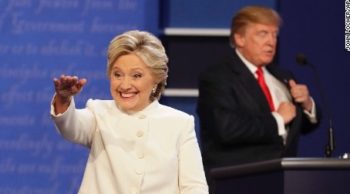 With three presidential debates and one for vice president behind us, David Leonhardt posted a helpful tally of debate questions — decrying the lack of a single question on one of the key issues facing humanity in this century and beyond: human-driven climate change. (The issue was touched on twice by Hillary Clinton in answers to other questions.)
With three presidential debates and one for vice president behind us, David Leonhardt posted a helpful tally of debate questions — decrying the lack of a single question on one of the key issues facing humanity in this century and beyond: human-driven climate change. (The issue was touched on twice by Hillary Clinton in answers to other questions.)
Paul Krugman and a host of environment-minded commentators weighed in, as well.
I put it this way on Twitter: “When journalism merely mirrors public worries, what happens? Zero debate questions on #climatechange.”
But of course there are deeper issues afoot.
In a moment, I’ll give the floor here to George Marshall, a longtime climate communication evangelist who’s written an invaluable book on “Why our brains are wired to ignore climate change and what to do about it.” And as a coda, you can watch two great discussions of ways to build “A More Scientific Union.”
But first, here are a few thoughts on this year’s debates and climate change.
Was that lack of such a pivot in this debate season an epic failure of the moderators?
To those of us focused on climate risks and solutions, and science-based issues more generally, sure.
But there were other unmentioned issues of great significance, as well, as Soledad O’Brien noted on Twitter (education, inequality).
And, frankly, it’s still incredibly hard for journalism to get ahead of existing public concerns. It happens once in awhile. There were warnings of the housing bubble ahead of the great recession and of the growing threat of mega terrorism ahead of the World Trade Center attacks on Sept. 11, 2001. The warnings are easy to spot after the fact, but largely hidden in the weeds of workaday coverage at the time. And there’s been plenty of fine reporting for decades on the growing risks posed by unabated greenhouse gas emissions.
The presidential debates, in theory, offer one of the few times when a prominent journalist can pivot from the heated real-time issues and buzzy talking points to pinning candidates down on tougher challenges that, mostly, lie over the horizon.
That didn’t happen this year. But it’s too facile to point fingers. Here’s why.
A Times story earlier this week on social and political factors behind the climate change silence included a telling bit of data from Yale’s Program on Climate Change Communication.
The director of the program, Anthony Leiserowitz, was explaining how President Obama’s focus on climate change in the past couple of years likely helped move global warming up a notch in public concern. He said Obama’s push is “part of the reason why global warming is No. 6 on the priority list among liberal Democrats and it wasn’t there before.”
Zoom in on these words: “Global warming is No. 6 on the priority list among liberal Democrats.”
If that’s the case for the sector of society most worried about climate change, it gets harder to justify attacks on debate moderators for failing to squeeze it in, no matter what you or I think.
















